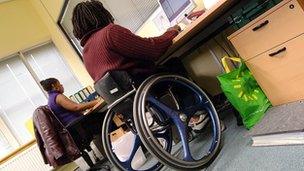Work fitness tests are 'confrontational' - review
- Published

Some people with disabilities face 'huge challenges' at work, charities say
An independent review, external of fitness-to-work tests has found "considerable dissatisfaction" among disabled people.
Dr Paul Litchfield, an occupational physician, highlighted the need to treat people with dignity and respect as a particular area for improvement.
Communication with disabled people by assessors was another area of concern.
Training advice on assessments showed a "confrontational set up", the report found, which "is not accepted practice in clinical healthcare".
Assessments could be improved by adjusting the layout of interview rooms, better listening skills and the avoidance of inferring answers not provided by interviewees, according to Dr Litchfield.
Work Capability Assessments were introduced in 2008 to determine who should receive Employment and Support Allowance (ESA).
Decisions are taken by officials at the Department of Work and Pensions using evidence from the assessments, carried out by Atos Healthcare professionals.
The assessment aims to judge how a person's condition limits their ability to work, rather than conferring eligibility for benefits simply because of a certain impairment.
The review also raises questions about the "arbitrary" nature of the points system used to determine eligibility for benefits.
It recommends that people with mental health problems should be assessed by practitioners with specific experience in that area.
Richard Hawkes, chief executive of the disability charity Scope, said the process "ignores" the "huge challenges" faced by disabled people such as a lack of skills and experience, confidence and negative attitudes from some employers.
"It's a tick-box test of someone's medical condition," he added.
'Good progress'
However, Dr Litchfield did acknowledge "good progress" made by the Work Capability Assessment system since its last review.
He commended the Department for Work and Pensions on its efforts in areas such as the way people with cancer are treated by the system, and on providing explanations for why benefits have been refused.
Minister for Disabled People Mike Penning welcomed Dr Litchfield's recommendations, and said his department will "carefully consider" before responding in order "to make sure we get this right for claimants - and right for taxpayers".
The minister pointed out that the government spends more than £13bn on sickness and incapacity benefits for people of working age.
In a separate announcement, the Department for Work and Pensions has said it will allocate £2m to support disabled who arrange their own work experience placements.
The fund is part of the Access to Work scheme, which was previously only offered to disabled people taking up work placements organised through Jobcentre Plus.
- Published22 July 2013
- Published21 June 2013
- Published16 May 2013
- Published8 February 2013